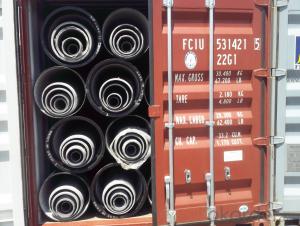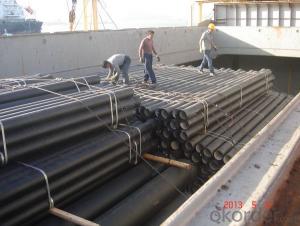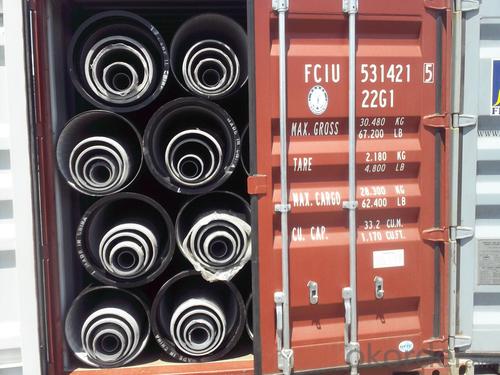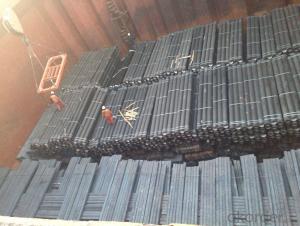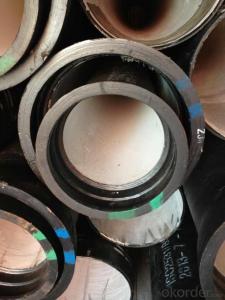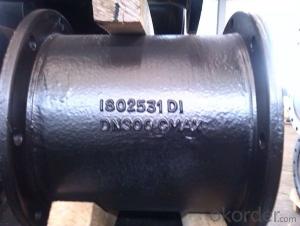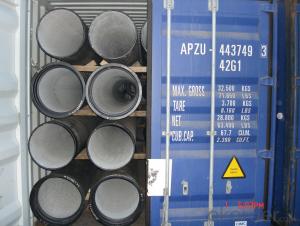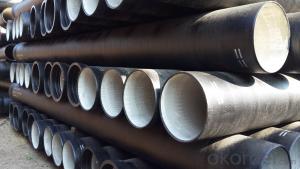DUCTILE IRON PIPE DC Class DN 350
- Loading Port:
- Tianjin
- Payment Terms:
- TT OR LC
- Min Order Qty:
- -
- Supply Capability:
- 30000Tons m/month
OKorder Service Pledge
OKorder Financial Service
You Might Also Like
CNBM ductile iron pipe ranges from DN80-DN1600mm (T-Type, Class K9), effective length 6m, comply with ISO2531 Standard
Company Profile
CNBM International Corporation is the leading production base and renowned supplier of Ductile Iron Water Pipe systems of both potable and waste water in China. We are constantly looking to develop high quality products to ensure the longest service life and wonderful performance.
CNBM Pipelines regard quality as the essential factor leading to successful business. Every pipe is tested in accordance with BS EN545 (water application) or BS EN598 (sewer application). CNBM Pipelines products comply with and are tested according to the relevant European and International Standards. Our pipes are manufactured under the quality management system BS EN ISO 9001. After years of efforts, CNBM Pipelines has built up great reputation in terms of quality and service among customers worldwide
Product Introduction
CNBM ductile iron pipe ranges from DN80-DN1600mm (Tyton, T-Type, Class K7/K8/K9), effective length: 6m, complying with BS EN545/EN598/ISO2531/BS4772.
Specification& Payment terms
Internal lining: Pipes shall have an internal cement mortar lining in acc with ISO4179.
External coating: Pipes shall be externally coated with metallic zinc spray plus a further layer of resin painting to ISO8179.
Gasket: 100% SBR/NBR/EPDM gasket in accordance with ISO4633.
Packing: Pipes from DN100 to DN300 be bundled with steel belts, the others are in bulk.
Payment term: By 30% T/T advance payment + 70% Irrevocable L/C at sight.
Packing: In bulk vessel or in container.
- Q: Can ductile iron pipes be used in high-temperature applications?
- Ductile iron pipes are capable of being utilized in applications that involve high temperatures. Unlike PVC or HDPE pipes, ductile iron pipes possess a higher melting point, rendering them suitable for transporting fluids at elevated temperatures. The material properties of ductile iron, encompassing its strength, toughness, and ability to withstand thermal stress, allow it to endure higher temperatures without distorting or failing. Nevertheless, it is worth noting that the precise temperature threshold for ductile iron pipes may vary depending on factors such as the grade of ductile iron employed, the pressure of the fluid being conveyed, and the duration of exposure to elevated temperatures. Consequently, it is imperative to consult the manufacturer's specifications and guidelines in order to ensure the appropriate selection and installation of ductile iron pipes for high-temperature applications.
- Q: How do ductile iron pipes handle extreme temperatures?
- Ductile iron pipes, also known as cast iron pipes, are known for their ability to handle extreme temperatures effectively. The material composition of ductile iron allows it to withstand both high and low temperatures without experiencing any significant damage or degradation. At high temperatures, ductile iron pipes exhibit excellent thermal resistance, making them suitable for applications where hot liquids or gases need to be transported. The high melting point of ductile iron, which ranges between 2060°C and 2200°C, ensures that the pipes can handle extreme heat without melting or deforming. This makes them ideal for use in industries such as oil and gas, steam distribution, and high-temperature water supply systems. Similarly, ductile iron pipes also perform well in low-temperature environments. They have a low coefficient of thermal expansion, meaning they can withstand the contraction and expansion that occurs during temperature fluctuations without cracking or fracturing. This makes them suitable for use in cold climates or applications that involve the transportation of chilled liquids or gases. Moreover, ductile iron pipes have excellent thermal conductivity, which allows them to quickly dissipate heat. This property is particularly important in high-temperature applications where efficient heat transfer is crucial to prevent damage to the pipes or the substances being transported. In summary, ductile iron pipes can handle extreme temperatures effectively due to their high melting point, low coefficient of thermal expansion, and excellent thermal conductivity. These properties make them a reliable choice for various applications that involve extreme temperature conditions.
- Q: What are the common methods for flow control in ductile iron pipes?
- Ductile iron pipes offer various options for flow control. Among them, valves are commonly used. Valves enable the regulation of water or other fluids flowing through the pipes. They can be either manually operated or automated, depending on the system's specific needs. Flow restrictors or flow limiters represent another method for controlling flow in ductile iron pipes. These devices are installed in the pipes to reduce the flow rate and ensure that the system operates within its intended parameters. Flow restrictors are particularly beneficial in situations where flow control is necessary to prevent damage or optimize system efficiency. Pressure regulators also contribute to flow control in ductile iron pipes. By maintaining a specific pressure level within the system, these devices help prevent excessive pressure that can lead to pipe bursts or other forms of damage. Furthermore, pressure regulators aid in maintaining a consistent pressure throughout the system, ensuring predictable and controlled flow. Flow meters provide yet another means of achieving flow control. These devices are installed in the pipes to measure the rate at which fluid passes through them. By monitoring the flow rate, operators can adjust valves or other flow control devices to maintain flow within the desired range. Flow meters are especially valuable in applications where accurate flow measurement is critical, such as industrial processes or water distribution systems. In conclusion, flow control in ductile iron pipes can be achieved through the use of valves, flow restrictors, pressure regulators, and flow meters. These methods can be combined or used individually, depending on the specific requirements of the system.
- Q: How is ductile iron pipe tested for quality?
- Ductile iron pipe is tested for quality through various methods, including visual inspection, hydrostatic pressure testing, and mechanical property testing. Visual inspection ensures that the pipe is free from any visible defects or imperfections. Hydrostatic pressure testing involves subjecting the pipe to water pressure that exceeds its maximum working pressure to check for any leaks or failures. Mechanical property testing assesses the pipe's strength, toughness, and other mechanical properties through tests such as tensile strength, yield strength, and elongation. These quality tests help ensure that ductile iron pipes meet the required standards and are suitable for their intended applications.
- Q: Do ductile iron pipes require cathodic protection?
- Yes, ductile iron pipes require cathodic protection. Cathodic protection is a technique used to protect metallic structures from corrosion by making them the cathode of an electrochemical cell. Ductile iron pipes are susceptible to corrosion, especially in aggressive soil conditions or when in contact with water containing high levels of corrosive substances such as chlorides or sulfates. Cathodic protection helps prevent corrosion by applying a direct electrical current to the pipe, which counteracts the natural corrosion process. This method ensures the longevity and integrity of the ductile iron pipes, reducing the need for frequent repairs or replacements.
- Q: What are the different pressure ratings available for ductile iron pipe?
- Ductile iron pipe, known for its strength, durability, and resistance to corrosion, finds widespread use in various applications. The pressure ratings of this type of pipe depend on factors like diameter and wall thickness. Typically, ductile iron pipe offers pressure ratings ranging from 150 psi to 350 psi. For pipes with smaller diameters, usually measuring between 3 inches and 24 inches, commonly available pressure ratings include 150 psi, 200 psi, and 250 psi. These ratings suit a broad range of applications, including water distribution systems, sewer lines, and industrial piping. For larger diameter pipes, typically ranging from 30 inches to 64 inches, the usual pressure ratings are 150 psi, 200 psi, 250 psi, and 350 psi. These higher ratings are necessary for transporting larger volumes of water or other fluids across longer distances. It is worth noting that the pressure ratings of ductile iron pipe adhere to industry standards and guidelines. These standards ensure that the pipe can safely withstand both internal pressure and external loads during operation. When choosing the appropriate pressure rating for ductile iron pipe, it is vital to consider factors such as the specific application, flow rates, and expected operating conditions. Seeking advice from industry experts and adhering to local codes and regulations is crucial to ensure the correct selection and installation of ductile iron pipe for a particular project.
- Q: What are the common causes of failure in ductile iron pipes?
- Ductile iron pipes can fail for various reasons. Corrosion is a significant factor. When exposed to water, soil, and other environmental elements, rust and corrosion can develop on the pipe's surface. This weakens the pipe's structure and eventually causes failure. Improper installation or mishandling is another common cause. If the pipes are not correctly installed or if they sustain damage during transportation or installation, they may develop cracks, fractures, or other physical defects. These issues compromise the pipe's functionality and contribute to failure. Inadequate design can also lead to failure. When a pipe is not designed to withstand expected loads, pressures, or environmental conditions, it becomes vulnerable to premature failure. It is crucial to carefully consider material properties, wall thickness, and diameter during the design process to ensure the pipe can handle the demands placed upon it. Failure can also result from poor maintenance and delayed repairs. Regular inspections, maintenance, and timely repairs are essential for identifying and addressing issues before they worsen. Neglecting these measures can lead to the gradual deterioration of the pipe, increasing the likelihood of failure. Lastly, external factors such as soil movement, seismic activity, or excessive traffic loads can cause failure in ductile iron pipes. These forces exert stress on the pipe, resulting in cracks, fractures, or complete failure. To prevent failure in ductile iron pipes, it is crucial to employ proper corrosion protection techniques, adhere to correct installation procedures, consider design factors adequately, implement regular maintenance and repair programs, and account for external factors during the planning and installation process.
- Q: What are the different corrosion protection options for ductile iron pipe?
- There are several corrosion protection options available for ductile iron pipes. These include internal linings such as cement mortar or polyethylene encasement, external coatings like zinc or polyethylene, and cathodic protection systems. Each option offers varying levels of protection and is chosen based on the specific needs and conditions of the pipe installation.
- Q: How can stainless steel pipes and ductile iron pipes be joined?
- The utility model can be connected with a wide range flange joint or a wide range flexible joint
- Q: What is the difference between cast iron pipe and seamless steel pipe and galvanized steel pipe?
- Galvanized steel pipe: divided into cold galvanized steel pipe, hot galvanized steel pipe, cold galvanized steel pipe has been banned, and the latter is also advocated by the state for the time being. In 60s and 70s, developed countries began to develop new types of pipes, and galvanized pipes were banned. China's Ministry of construction and other four ministries also issued a civilization, indeed from two, 000 years since the galvanized pipe as a water supply pipe, the New District cold water pipe has rarely used galvanized pipe, and some of the hot water pipe is galvanized pipe. Hot dip galvanized steel pipe is widely used in fire, power and highway.
Send your message to us
DUCTILE IRON PIPE DC Class DN 350
- Loading Port:
- Tianjin
- Payment Terms:
- TT OR LC
- Min Order Qty:
- -
- Supply Capability:
- 30000Tons m/month
OKorder Service Pledge
OKorder Financial Service
Similar products
Hot products
Hot Searches
Related keywords
